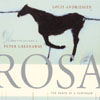Andriessen Rosa: The Death of a Composer
Music that switches mood from relative austerity to tempered ferocity, often without warning. The sex and violence are in the words as well as the music
View record and artist detailsRecord and Artist Details
Composer or Director: Louis Andriessen
Genre:
Opera
Label: Nonesuch
Magazine Review Date: 2/2001
Media Format: CD or Download
Media Runtime: 112
Mastering:
DDD
Catalogue Number: 7559-79559-2

Tracks:
| Composition | Artist Credit |
|---|---|
| Rosa: The Death of a Composer |
Louis Andriessen, Composer
Asko Ensemble Christopher Gillett, Alcan, Tenor Louis Andriessen, Composer Lyndon Terracini, Juan Manuel de Rosa Marie Angel, Blond Woman, Soprano Marie Angel, Second Singer, Soprano Marie Angel, Esmeralda, Soprano Miranda Van Kralingen, Investigatrix Miranda Van Kralingen, First Singer Miranda Van Kralingen, Madame de Vries Miranda Van Kralingen, Texan Whore Phyllis Blanford, Index Singer Reinbert de Leeuw, Conductor Roger Smeets, Cowboys, Baritone Roger Smeets, Lully, Baritone Schönberg Ensemble |
Author: Rob Cowan
When annotator Greg Sandow writes that ‘Rosa has an urgency you won’t find in most new operas’, he’s not kidding. Bellini it certainly isn’t, though Esmeralda’s music at the beginning of scene 7 comes perilously close to being an aria. Film director Peter Greenaway’s tale of ‘a melodramatic conspiracy against composers’ takes Anton Webern, who was shot by an American soldier at the end of the Second World War, as its starting point. Indeed, we’re told that Rosa’s corpse was found naked ‘save for his hat … his spectacles … [and] his Havana cigar’. These Webernian props even extend to the near-parallel of Rosa’s cowboy killers. In a bizarre ninth scene ritual, the composers Alkan and Lully (two further hostages to misfortune) marry fiancee and corpse ‘till death parts’ them. Charming.
Andriessen’s band comprises woodwinds, brass, synthesizers, percussion and a few amplified strings. The style recalls the bold contrasts in, say, De materie, with tough-fisted rhythms (mostly jagged and irregular) and stark fortissimo chords. The overture is typically confrontational but some of the most powerful music in the score occurs at the end of scene 4 (from around 9'48'' on track 5, disc 1) where, in true murder-mystery fashion, a missing clue thwarts the drama’s successful resolution. Heavy Blues settle among the opening pages of the fifth scene, and the eleventh opens to a Morricone-style solo harmonica, where the hub of the theme reflects another of Andriessen’s obsessions. It’s a certain Brahms Waltz (from Op 39, as it happens) that his sister used to hum in their childhood bedroom and that also crops up earlier on in the piece. Who would have thought sentimentality would figure in such a blatantly bestial context, but there you have it! The last scene is trailed by a raunchy, rock-style ‘Index Singer’ who opens by defining Abattoir (‘The location of the opera … A slaughterhouse’, etc) and gets as far as Gas, via the likes of Dump and Envy. She eventually makes an exit, but the printed text takes us all the way from Glass-Haired to Zig-Zag.
Rosa was premiered at the Netherlands Opera in 1994 and the performance under review is superb, though special mention should be made of soprano Marie Angel, a marvellous singer and a formidable vocal actress. Peter Greenaway’s libretto is erotic, often lyrical and profoundly ambiguous. Unusually, the words and synopsis complement each other: you read one, then study the other for further elucidation. But the music is pure Andriessen, blanched in the quieter music, and punch-drunk when the going gets hot. It’s a music of extremes. I adore it, but if you’re unsure, play a minute or so of the overture and the whole of scene 4 (10'36''-worth on disc 1, track 5). That’ll tell you all you need to know … more or less.'
Explore the world’s largest classical music catalogue on Apple Music Classical.
Included with an Apple Music subscription. Download now.

Gramophone Digital Club
- Digital Edition
- Digital Archive
- Reviews Database
- Events & Offers
From £9.20 / month
Subscribe
Gramophone Club
- Print Edition
- Digital Edition
- Digital Archive
- Reviews Database
- Events & Offers
From £11.45 / month
Subscribe
If you are a library, university or other organisation that would be interested in an institutional subscription to Gramophone please click here for further information.






